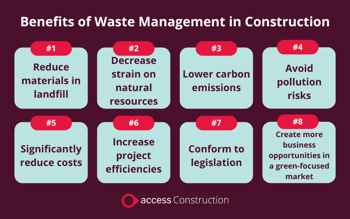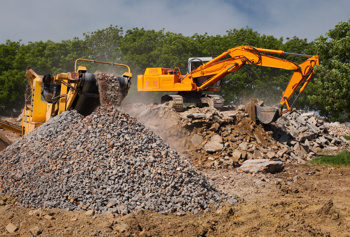How To Reduce Waste In Construction
Construction waste is an inevitable part of any construction project. However, by deploying waste management techniques during building, renovation or demolition works can both reduce costs and create lasting benefits for the environment. This article looks at how construction technology can solve the UK’s construction waste problem.
What is Construction Waste?
Construction waste refers to the discarded materials and products that are generated through construction activities such as building, deconstruction or demolition. Within the construction industry, it can also refer to surplus materials that are ordered for a project due over-ordering or inaccurate estimating.
Whilst the types of products most commonly wasted are wildly varied, here are some of the most common materials wasted on UK sites today:
- Bricks, concrete, ceramics
- Insulation materials
- Wood, plastic and glass
- Bituminous materials and tar
- Metal waste including pipes and cable
- Cement
- Contaminated and dredged soil

Why Should You Reduce Construction Waste on Your Projects?
In recent statistics published by DEFRA (Department for Environment, Food and Rural Affairs), the UK construction industry reportedly generated 59.1 million tonnes of non-hazardous C&D waste.
Waste from construction, deconstruction, and demolition accounts for almost 62% of all UK waste generated annually.
Some of this waste can be recycled and reused in future in construction schemes. However, a large percentage is sent to landfill and rendered unusable. In fact, in 2016, nearly a quarter of all waste generated that year was sent to landfill, equating to almost 5 million tonnes of construction waste.
With mounting pressure from the public and government to reduce these numbers, it is down to construction companies to deploy waste management techniques to solve this growing problem.
How Does Construction Waste Impact the Environment?
As an industry, construction is responsible for around 23% of all air pollution, 40% water pollution and an estimated 50% of all landfill waste. When weighing up these numbers against other industries, it has long been clear that construction businesses and schemes must prioritise reducing these statistics.
Unfortunately, most construction waste isn’t biodegradable. This leads to many landfill sites being filled with materials that will takes hundreds of years to naturally decompose.
Additionally, hazardous waste makes up a substantial percentage of construction and demolition waste. When not managed correctly, these substances can leach toxic properties into nearby waterways, ground or even into the surrounding atmosphere.
The Benefits of Waste Management in Construction
Waste management in construction can have ample benefits, which can best be categorised into two types: the benefits for the environment and the benefits for construction businesses.
Benefits For The Environment
First and foremost, reducing construction waste will have significant impacts on local environments. By prioritising deconstruction over demolition, implementing site waste management plans and ordering the correct amount of materials during construction, businesses can:
- Reduce materials ending up in landfill
- Reduce the strain on natural resources
- Lower greenhouse gas emissions (generated through transportation, recycling or disposal processes)
- Avoid pollution risks in rural and urban areas
Benefits For Construction Companies
However, reducing construction waste also has multiple benefits for construction businesses themselves. By focusing on waste mitigation and implementing comprehensive site waste management plans, businesses can:
- Significantly reduce costs (materials, transport)
- Increase project efficiencies
- Conform to legislation such as the Environmental Protection Act
- Create more business opportunities in a green-focused market

Waste Management Techniques:
Now that we’ve defined construction waste and explained why we should be reducing waste in our construction projects, let’s take a look at some of the best waste management techniques you can use today.
As costs rise and lead times lengthen, it is more important than ever to ensure that your projects are planned comprehensively during preconstruction. By ordering the right amount of materials, prioritising recycling and reuse, and implementing comprehensive site waste management plans businesses can benefit the environment as well as their bottom line.
Let’s take a look at some of the best waste management techniques used in UK projects today.
Ordering The Correct Amount of Required Materials
When ordering your materials it’s crucial that as much care as given to the estimation process as the construction phases. While it is normal to order slightly more materials than needed, to account for damages or errors, try to accurately estimate the materials required.
Over-ordering is one of the key causes of construction waste. This can be avoided by deploying a skilled quantity surveyor and sourcing leading estimation software to help estimate exact requirements.
Additionally, a less direct but equally impactful way of reducing construction waste is to source materials from the right vendors. Choosing materials and products made from recycled materials or even partnering with companies that commit to reducing transportation emissions can all help meet your waste management targets.
Deconstruction Vs Demolition
For projects within existing developments, prioritising deconstruction over demolition can have lasting impacts on the environment and reducing construction waste. Whilst both demolition and deconstruction share the goal of destroying a building, deconstruction is focused on salvaging existing materials, products and components.
The salvaged materials can then often be reused or recycled on future projects. Unfortunately, due to the added costs associated with deconstruction and longer timelines, many forgo the environmental benefit in favour of convenience.
Reusing Or Recycling Materials
When sourcing materials, look for suppliers who manufacture using recycled materials or are committed to reducing emissions through their processes or transportation methods. Whilst these are less direct methods of reducing construction waste, each of these initiatives can go a long way for minimising the environmental impacts of construction works.
Where possible, construction companies should also aim to reuse any waste materials generated on-site. In instances where materials are leftover, safely store any timber, bricks, and other leftover building materials for use in other projects.
Even if materials or goods are damaged, try to determine if they can be reused elsewhere.
Use A Site Waste Management Plan
In the UK, every construction site should ideally have a comprehensive Site Waste Management Plan (SWMP) in place before construction begins. By law, SWMPs are required for all projects within England with an estimated construction cost of over £300,000.
However, even projects outside of these criteria can benefit both themselves and the environment by organising a Site Waste Management Plan.
A Site Waste Management Plan covers the following:
- Who will be responsible for resource management
- What types of waste may be generated
- How will the waste be managed – reduced, reused or recycled?
- Which contractors will ensure all waste is disposed of responsibly and legally or where possible recycled
- How the quantity of waste generated will be measured
By implementing these plans, businesses can help to manage and reduce the amount of waste that is generated on-site, reducing the effect on landfills. Furthermore, these plans help preserve local environments, reduce energy consumption and promote a greater focus on using recycled materials.
Like the other techniques, however, SWMPs can have substantial effects on construction businesses, helping them to cut costs. By being more responsible around material ordering and usage, companies can reduce upfront expenditures, as well as the costs associated with disposal.
Using Software to Manage & Reduce Waste in Construction
When looking for a holistic solution for construction waste management, many software solutions on the market today can help businesses manage materials and waste reduction. Enterprise Resource Planning (ERP) software provides companies with a complete platform to manage and optimise their inventory.
Some even include data-driven forecasting which can help site managers make choices on ordering materials and estimating lead-times based on live and historical information.
By finding construction-specific ERP software, companies can reduce waste by having greater oversight on their assets, reduce overordering and streamline supply chains.
Construction supply companies can also use specific systems to help track and reduce their waste. Waste management software such as Access Weighsoft uses data collection across waste operations for visibility and efficiency. Reports generated by the software also helps construction suppliers remain compliant with government legislation.

Reduce Waste in Construction with Access COINS
Manage, optimise and reduce construction waste with Access COINS. End-to-end construction business management software provides you and your team with full visibility on existing assets. With powerful forecasting capabilities, predict where materials will be needed on a case-by-case basis, to avoid over-ordering.
Construction contractors can also reduce waste using powerful estimating software such as Access ConQuest. Allowing surveyors to better understand the requirements of each of your projects, ensuring you always have exactly the materials you need on-hand.
Suppliers and waste management companies can also reduce their impact by using specific waste management software.
For more information on how Access COINS and Access ConQuest can help your business reduce waste, speak to one of our experts today. Or book yourself in for a product demo here.





